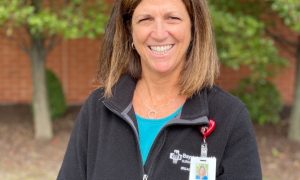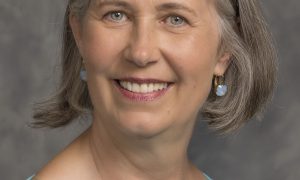
From left: Donna Stern, Sandra Lortsher, Tammy Bringaze, John Velis, and Brian Sullivan. The five of them offered their perspectives on Baystate Health’s imminent closure of the mental health wings in Westfield, Palmer, and Greenfield. They were in agreement that the closures will have a negative impact on the communities. (Photo by Peter Currier)
WESTFIELD- A forum was held Thursday evening in the Westfield Athenaeum to discuss the planned closure of Baystate Noble Hospital’s Fowler wing, a unit of the hospital dedicated to mental health.
The main panel consisted of Baystate Franklin Hospital Psychiatric Nurse Donna Stern, Baystate Noble Hospital Psychiatric Nurse Sandra Lortsher, Westfield State University Counseling Center Director Tammy Bringaze, State Representative John Velis, and Mayor Brian Sullivan.
The packed room consisted of people in Westfield from all walks of life to discuss what they believe will be a detriment to the community if the Fowler Wing closes. There were students from WSU, City Councilors, nurses, and doctors in attendance.
“Noble Hospital has been in this community for a long time,” said Velis, “I think it’s fair to say that the residents of Westfield love that fact.”
In February Baystate Health announced that a new inpatient mental health facility would be built in Holyoke. To do so, Baystate Health is partnering with US HealthVest, a company that specializes in psychiatric care. In addition, however, Baystate Health (BH) said that they would be closing the psychiatric health wings of Noble Hospital in Westfield, Franklin Medical Center in Greenfield, and Wing Memorial Hospital in Palmer.
“We closed state hospitals for a reason in this state. We were a forerunner,” said Lortsher, “This is a step backwards. This is just a for-profit state hospital.”
Among the many concerns raised by the panelists and the audience was that BH is seeking profit over the needs of the communities being affected. Stern said that the priorities of a healthcare corporation such as BH are not the same as the community. Should the mental health wing close in Franklin Medical Center, where she works, the drive to the new facility in Holyoke can be upwards of 45 minutes. When one is having a mental health crisis, Stern and the other panelists said, that is far too long of a drive to get help.
“It would be a minimum of 45 minutes away from their family members and loved ones,” said Stern, “Then we have to start talking about transportation.”
Stern added that she felt like the affected communities were left out of the conversation by BH and US HealthVest.
“The elephant in the room is that Baystate has questions they need to answer. When they made this decision, they did not involve the communities. There was no discussion or warning. I will always remember where I was when they told us.”
In a press release from the announcement by Baystate Health in February, they said that the new facility would increase the service area for mental healthcare by 30 percent.
“The new hospital will allow for better service to special populations of behavioral health patients who currently have difficulty accessing services because there are not enough local beds. These include children/adolescents, geriatric patients, behaviorally disruptive patients, and substance abuse/dual diagnosis patients,” said the press release. It continued on to say that the current mental health wings were “aging and decentralized.”
Stern noted that Franklin Medical Center has 22 beds in their mental health wing, but they have a capacity of just 13 people. She said that Franklin Medical Center used the 13 person average as justification to close their wing, as it wasn’t being filled. She added that Franklin did not disclose to the public that the 13-person average was a capacity they set themselves. Several members of the audience noted that Baystate Noble Hospital recent went under renovations, which they said included the Fowler Wing.
“I am really concerned about the effect this move could have on people we don’t hear from on a daily basis,” said Velis, “The disenfranchised politically, the disaffected politically. The ones who are not going to schedule a meeting with me on beacon hill. I really want to hear from those groups because I have a feeling that the decision was made and they did not take into account those groups of people.”
Stern noted that her hospital in Greenfield and other non-profits like it are willing to keep a patient for as long as it takes until they are well enough to be discharged. She gave an example of a patient who they recently discharged after 74 days in the psychiatric hospital.
“I promise you that person would not be staying for 74 days in a for-profit hospital,” said Stern, “We’re talking about the most vulnerable people in our communities who need to be respected and treated with dignity.”
Another point of concern was the access of mental health facilities by college students. Bringaze, who said her office at the WSU Counseling Center works very closely with Noble Hospital and the Fowler Wing. She and a group of WSU students in attendance said that college students are among the most at risk populations for psychiatric health issues. The close proximity of Noble Hospital to WSU allows for a quick transport of the patient to the care they likely need. The drive from WSU to Holyoke could be as long as 30 minutes, which the panel maintained is too long for a mental health emergency. It was noted by the panelists that those who are discharged are often not provided with any form of transportation to get home or back to school.
In Baystate’s February statement, they said that local outpatient and partial hospitalization facilities would remain as they currently are.
“This process is in the very early stages, with the first step focused on securing a site for the hospital to be centrally located within Baystate Health’s service area. It is anticipated that from the time a site is secured, it will be at least two years before the new hospital is operational. This estimate accounts for time to design and construct the hospital and complete the licensing process. A potential site is being explored, and the organization hopes to have more information to share in the next few months,” said the statement.
The panelists and the members of the audience emphasized their concern with the potential for short stays at the new facility in Holyoke. When patients stayed for a longer period of time, it was said that not only did their mental health improve, but it gave them the opportunity to gain knowledge and skills while they are there. A psychiatrist in the audience said that the first 72 hours after discharge are the most dangerous periods of time for someone suffering a mental health crisis. They said that the transition from a structured, empathetic environment to one filled with stress can trigger another mental health crisis.
Stern noted that she had invited representatives of Baystate Health to attend the forum and others like it, but they did not take her up on the offer and were not present.
Near the end of the forum, Mayor Sullivan commented that he was surprised that the attendees and panelists were actually supportive of an additional facility in Holyoke being opened. However he added that it seems like the closure of the three other wings in question would be detrimental in any case.
In the February statement, Baystate Health said that they would further evaluate the inpatient behavioral unit at Baystate Medical Center in Springfield.
“Baystate Health will continue to evaluate the inpatient unit at Baystate Medical Center (APTU) to ensure behavioral health patients with complex medical needs are accommodated for, providing the ability to access the resources of the health system’s academic medical center. Because this change is in the early stages, things are still developing, and the organization does not have answers to all potential questions at this time,” said the statement, “As plans for the future are made, the operation of the current inpatient behavioral health units will continue as usual. Baystate Health is committed to ensuring, for staff and for patients and their families, that these units continue to operate smoothly and efficiently and will continue to deliver the same level of high quality care that the community deserves and expects.”








